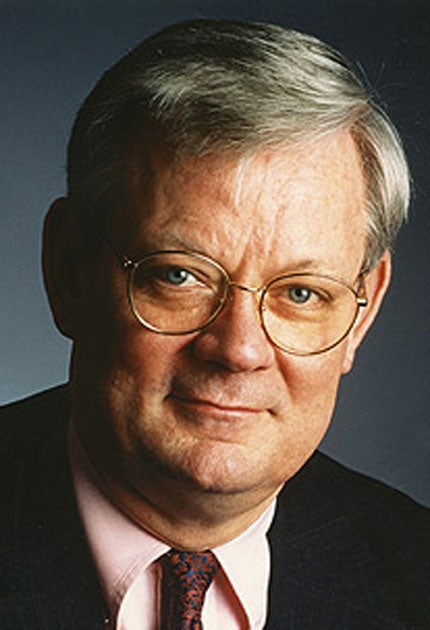David Alexander: US national secretary to the Rhodes Trust

Your support helps us to tell the story
From reproductive rights to climate change to Big Tech, The Independent is on the ground when the story is developing. Whether it's investigating the financials of Elon Musk's pro-Trump PAC or producing our latest documentary, 'The A Word', which shines a light on the American women fighting for reproductive rights, we know how important it is to parse out the facts from the messaging.
At such a critical moment in US history, we need reporters on the ground. Your donation allows us to keep sending journalists to speak to both sides of the story.
The Independent is trusted by Americans across the entire political spectrum. And unlike many other quality news outlets, we choose not to lock Americans out of our reporting and analysis with paywalls. We believe quality journalism should be available to everyone, paid for by those who can afford it.
Your support makes all the difference.American secretary to the Rhodes Trust for 17 years, Professor David Alexander CBE was a driving force behind the success of the Rhodes Scholarships in the US.
The Rhodes Scholarships are the world's oldest, and arguably most prestigious, international scholarships. They have brought students from around the world to the University of Oxford since 1903. Scholarships are awarded to students who demonstrate a strong propensity to emerge as "leaders for the world's future" and American alumni include former President Bill Clinton, Governor of Louisiana Bobby Jindal, as well as three currently serving US Senators and several Supreme Court Justices.
Alexander served as US national secretary to the Rhodes Trust from 1981 to 1998. He was instrumental in encouraging more women applicants for the Rhodes Scholarships, as well as ensuring broader diversity. During his service, Alexander worked tirelessly to organise the Rhodes selection process, overseeing the selection of 32 Rhodes Scholars in the United States each year, which required correspondence with up to 800 higher- education institutions. His work was recognised by the Queen in 1998 when he was ordained as a Commander of the British Empire.
Alexander was born in Springfield, Tennessee on 18 October 1932 and grew up in Princeton, Kentucky. In 1954, he was awarded a Rhodes Scholarship to study for a doctorate in theology at Christ Church, Oxford. On his return to the US, Alexander was ordained as a Presbyterian minister and an Old Testament scholar, taking up a teaching post at San Francisco Theological Seminary before serving as president of Rhodes College (formerly Southwestern at Memphis) from 1965 to 1969. In 1969, he accepted a position as the seventh president of Pomona College in Claremont, California. Under his 22-year leadership, Pomona College increased the racial, ethnic and geographical diversity of the student body, solidified its reputation as one of the leading liberal arts colleges in America and increased its endowment value more than tenfold.
Alexander also served on the board of directors of the National Association of Independent Colleges and Universities, the American Council on Education, the Louisville Presbyterian Theological Seminary, and Community Supported Television of Southern California. Alexander wrote the American chapter of the history of the Rhodes Trust, and in 2000 was honoured as a Distinguished Friend of Oxford University. From 2004, he served as the president of the American Friends of the National Portrait Gallery, London. In 2006 he was elected as a Fellow of the American Academy of Arts and Sciences.
Alexander fought a long and courageous battle with cancer, and is survived by his wife of 54 years, Catharine, their three children, Kitty, John, and Julia, and their families.
David Alexander, scholar and academic administrator: born Springfield, Tennessee 18 October 1932; married Catharine (one son, two daughters); died Claremont, California 25 July 2010.
Join our commenting forum
Join thought-provoking conversations, follow other Independent readers and see their replies
Comments